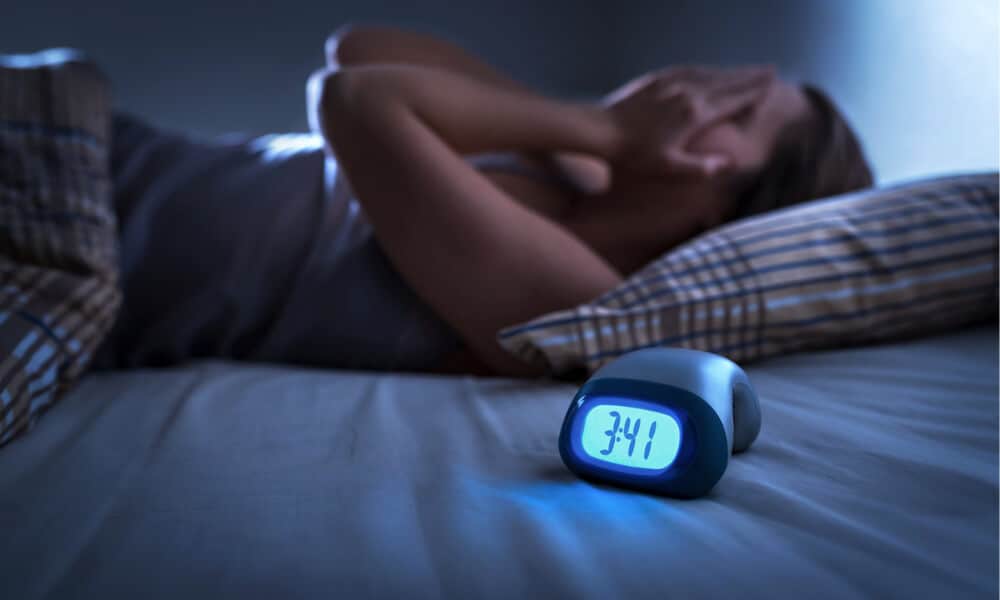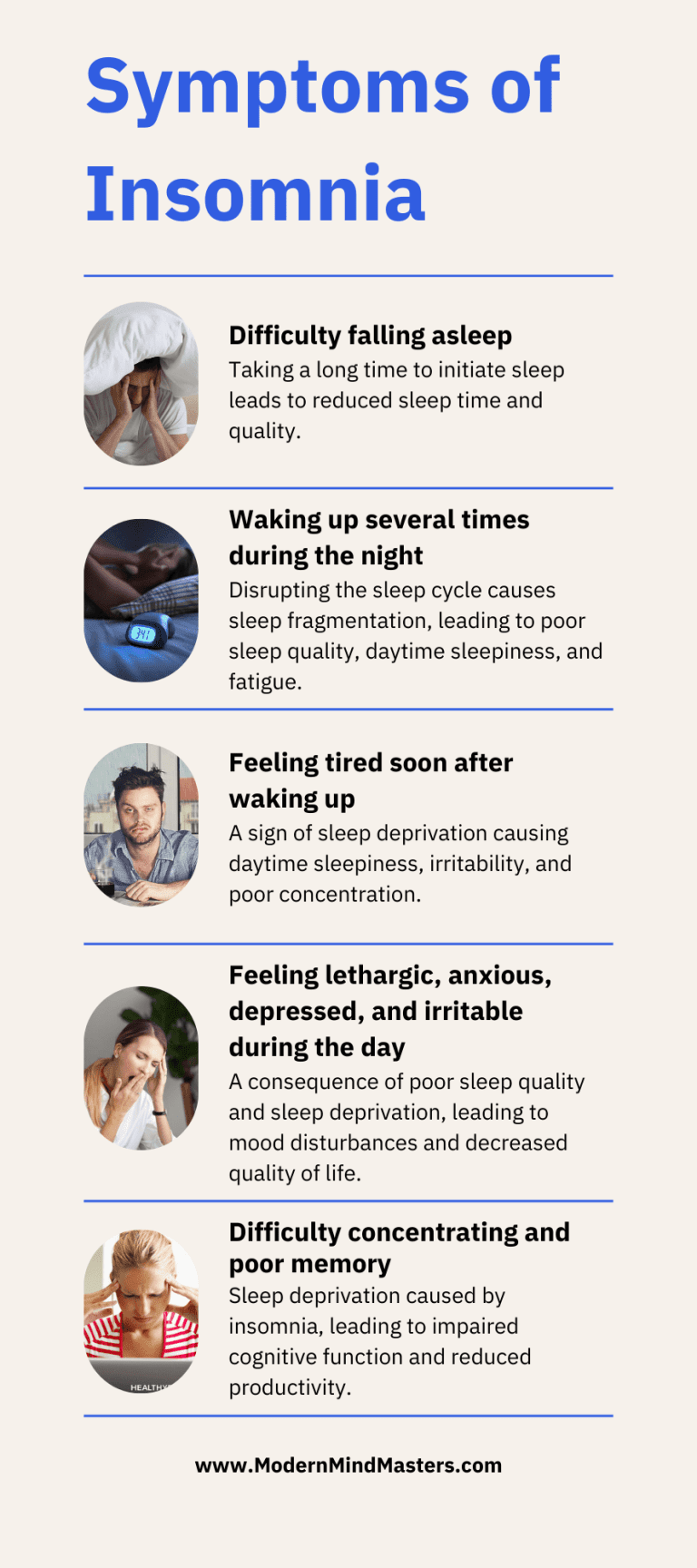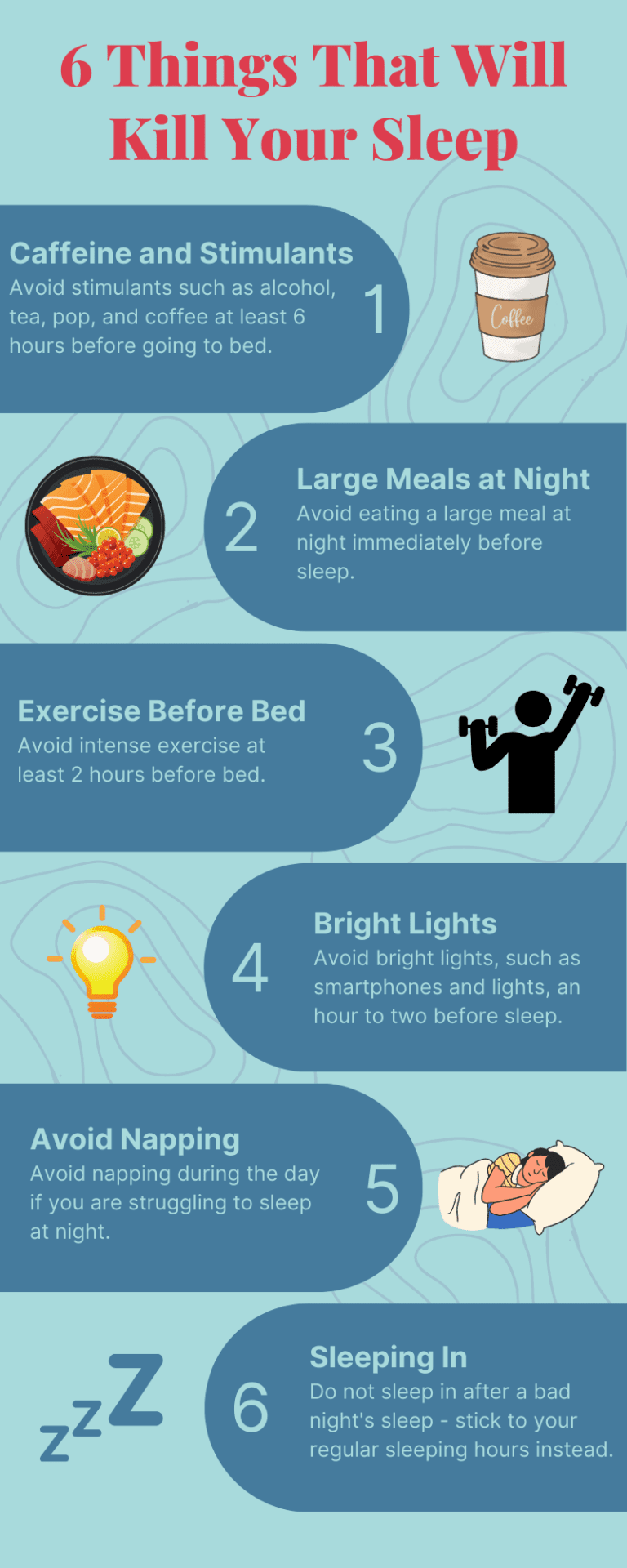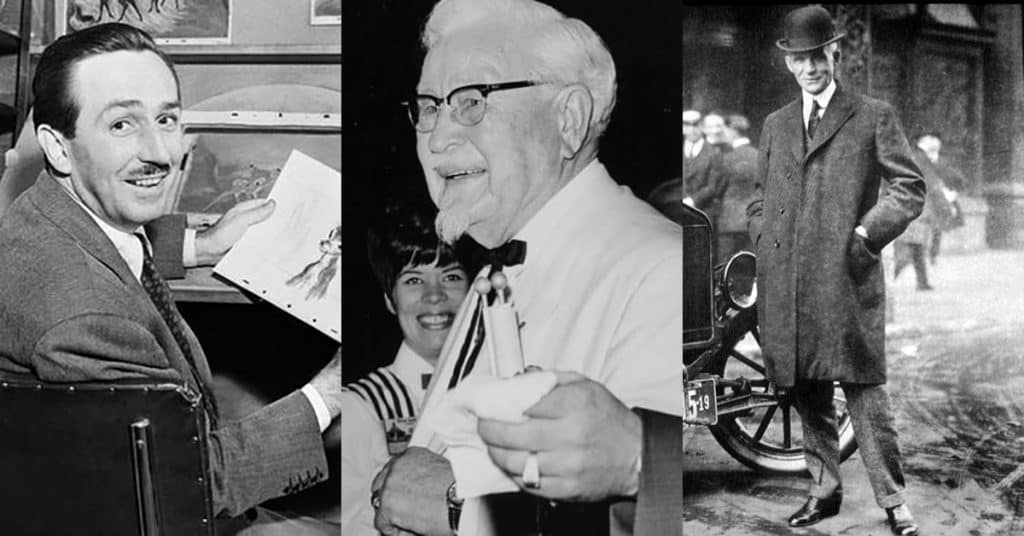Why You’re Struggling to Sleep and How to Overcome It
Key Points:
- Difficulties sleeping can be caused by many factors, both genetic and environmental.
- Caffeine, sleep schedules, sleep environments, and stress are some of the most common sources of sleep disturbance.
- Research has shown that exercise, spending more time outside, and relaxing an hour before bed are quick ways to increase sleep quality and duration.

You lay there staring at the ceiling. Minute after minute goes by, and no matter how many sheep you count or deep breaths you take, the stress from not sleeping makes you more awake than ever.
We’ve all been there – few things are more frustrating than not being able to fall (and stay) asleep. For most, this experience is thankfully infrequent, but for others, it can be a daily battle.
While the list of potential reasons why you’re struggling to sleep is long and varies massively based on the individual, there are a few that cause the vast majority of issues.
This article will specify the most likely causes behind your sleeping difficulties and what steps you can take for a better sleep tonight.
What is Sleep Insomnia?
According to the American Sleep Association, about 30% of adults in the United States experience short-term insomnia. Perhaps more worryingly, 10% experience chronic insomnia, defined as lasting for at least three nights a week for three months or longer.
Sleep insomnia can involve difficulties falling and remaining asleep, with sufferers often complaining about trouble falling back to sleep after just a few hours sleep.
As a result of sleep deprivation, insomnia hinders daytime functioning, including fatigue, difficulty concentrating, and irritability.
Symptoms of Insomnia
The list below identifies the most common symptoms of insomnia:
- Difficulty falling asleep
- Waking up several times during the night
- Feeling tired soon after waking up
- feeling lethargic, anxious, depressed, and irritable during the day
- Difficulty concentrating and poor memory during the day

Causes of Sleep Insomnia
Insomnia is tricky to manage and overcome due to its multitude of causes. There are, however, a handful of common factors that significantly affect our ability to obtain quality sleep.
Genetics
Some people are born night owls, preferring to wake later in the morning and work later at night. Others are morning birds, favoring to sleep and wake earlier. While night owls often get a bad rap as lazy and having poor habits, this natural preference is largely tied to genetics.
Whether an early bird or a night owl (known as your chronotype), living a schedule that goes against it can lead to difficulty sleeping.
This is particularly problematic for night owls, whose work schedules force them to sleep and wake early against the natural grain of their body’s sleep urges.
Little can be done to combat this – it can be just as difficult changing our work schedule as it is our genetics – but finding a job that better aligns with your natural sleep schedule, if possible, will help tremendously.
Caffeine
We know caffeine as an energy booster that helps us overcome those times when we’re groggy and tired. But caffeine has a longer-lasting effect on the body than most realize.
Caffeine has a half-life of seven hours, that is, half of the caffeine you ingest will still be in your system seven hours after consuming it. If you consume any coffee, alcohol, or energy drinks later than 3 pm, half of its caffeine will still be in your system by 10 pm.
Caffeine blocks the action of adenosine, a neurotransmitter that promotes sleep and suppresses arousal, by binding to its receptors in the brain and preventing it from inducing drowsiness, thereby promoting wakefulness and reducing the ability to fall asleep.
While useful first thing in the morning when you want to wake up quicker by blocking adenosine, it proves detrimental when still in your system while trying to sleep.
For some, such as myself, the effects of caffeine are much smaller than for others, such as my wife. While I can comfortably consume a coffee at 4 pm and have no trouble sleeping, my wife will not be able to sleep when taking a coffee past noon.
Body composition and metabolism likely play a role, but for those late-afternoon coffee lovers who struggle to sleep, bringing forward that late-afternoon coffee could make a significant difference.
And for those who try to find a way around by drinking decaf, note that decaffeinated does not mean caffeine-free – a decaf coffee still contains around 2mg of caffeine, 5% of a regular one.
Coffee is not the only caffeine source, however: tea, energy drinks, pop, chocolate, some medications (such as pain relievers and weight loss supplements), and alcohol all contain significant enough quantities of caffeine to affect sleep.
Sleep Routine
Humans are creatures of habit – we crave the certainty and safety that routines provide. The same is true of our sleeping habits.
Maintaining a consistent sleep schedule can be incredibly beneficial for improving sleep quality; it supports our natural circadian rhythm by enabling our bodies to keep in sync with it. As a result, a more defined sleep/wake cycle emerges that promotes better sleep quality.
Findings suggest that later sleep timing, oversleeping, and greater sleep variability were generally associated with adverse health outcomes such as a lowered immune system, an increased risk of developing chronic health conditions like diabetes and heart disease, and a deterioration in mental health.
Stress & Anxiety
Stress and anxiety are a natural part of life, even for the most positive of people. We’ve all had those stressful days where worrying about the future causes us to toss and turn for hours.
For some, however, this stress is perpetual, turning sleep loss from a one-night annoyance to a chronic health condition.
Insomnia is also common among individuals with anxiety disorders, with up to 50% of anxiety sufferers experiencing insomnia.
Further studies suggest that individuals with depression are at a higher risk for insomnia – 90% of people with depression experience some form of sleep disturbance.
While insomnia due to mental health disorders requires qualified medical guidance, there are some steps basic steps that will help the majority alleviate some of the symptons.
Ideally, we need to remove the source of anxiety. Sometimes this is doable, such as getting that essay that is hanging over your head done with. When you make progress with your biggest problems, you remove a great deal of stress associated with them.
Other times it is not so simple. Financial worries, such as how to pay this month’s rent and expenses having lost a job, are not so easy to solve. Exercises such as deep breathing and meditation are not cures but can enable the body to physically relax, often easing the intensity of stress on the brain.
Related Article: Positive Psychology – The Scientific Way to Achieve Postivity.
Sleep Environment
Unsurprisingly, our sleep environment plays a significant role in determining the quantity and quality of our sleep.
Temperature
If you are too hot or cold, your sleep is more likely to be disrupted. Sometimes, however, you can be cold without realizing it. My wife, for example, had difficulty sleeping for months until she simply put on a pair of socks. Although she didn’t feel cold, this subtle temperature variance was enough to ensure she slept soundly through the night.
The ideal room temperature for sleep can vary from person to person, but generally, experts recommend keeping the bedroom temperature between 60-67 degrees Fahrenheit (16-19 degrees Celsius).
Noise
Some tolerate noise more than others, but for me at least, I cannot sleep with any noise – except, to my great surprise, white noise.
Try a white noise app or device that will smooth out irregular noise with a light and consistent one. If white noise doesn’t work for you, you can try soundproofing your windows or using earplugs.
Light
Light suppresses the production of melatonin, a chemical in the brain that makes you sleepy and prepares the body for sleep. When exposed to light before sleeping, melatonin levels are suppressed and you are less likely to sleep.
This is why experts recommend not looking at bright screens such as computers, phones, and televisions a few hours before sleeping. It is also why you shouldn’t turn the lights on when using the restroom in the middle of the night (dimmer night lights are a much better solution).
Try darkening your room by closing doors and blinds, and look into installing blackout curtains if you’re still exposed to light.
Uncomfortable Bed
No rocket science here – an uncomfortable bed will keep you tossing and turning and prevent you from sustaining a night of deep sleep.
People have different preferences for mattresses; some require firmness, others softness, with the majority somewhere in between.
Mattress shopping can feel like walking into a minefield; with so many types of mattresses to choose from, from foam to spring and hybrid, picking the right one can feel overwhelming.
Thankfully there are dozens of excellent buyer guides to help make your decision. Combined with the generous trial and returns periods good mattress companies offer, there is no reason you will not be able to find a mattress that facilitates good sleep.
Sleep Disorders
There are many types of sleep disorders that can be categorized into four main groups:
Insomnia
Insomnia is a sleep disorder in which a person has trouble falling asleep or staying asleep, even when they have the opportunity to do so, leading to daytime fatigue and difficulty concentrating.
Sleep Apnea
Sleep apnea is a disorder in which a person’s breathing is interrupted during sleep. This can cause loud snoring, gasping, or choking sounds, leading to daytime fatigue, headaches, and other symptoms.
Sleep apnea can be caused by a variety of factors, including obesity, genetics, and other medical conditions.
Narcolepsy
Narcolepsy is a disorder in which a person has excessive daytime sleepiness and can fall asleep suddenly and uncontrollably, often at inappropriate times. Narcolepsy can be caused by a variety of factors, including genetics and other medical conditions.
Restless leg syndrome (RLS)
RLS is a disorder in which a person has an uncomfortable sensation in their legs, which can only be relieved by moving or rubbing them, causing difficulty falling or staying asleep.
RLS can be caused by a variety of factors, including genetics and other medical conditions.
All of these above conditions are complex and require professional medical advice. If you believe you may be suffering from any, seek medical help from a qualified medical professional.
Things You Can do to Promote Better Sleep
Knowing about your sleeping problems is only half the battle; putting into place actionable steps to overcome them forms the other half. Below are some activities you can do to improve your chances of getting a sound night’s sleep.
Exercise
Regular exercise has a multitude of benefits, such as improving cardiovascular health, weight management, and boosting immune health. But exercise can also help tremendously with sleep quality.
Exercise is a natural stress reliever. Endorphins released during moderate activity reduce anxiety and tension by acting as natural mood elevators. Studies show that exercise improves sleep quality by increasing slow-wave sleep stability.
Relax at Least One Hour Before Bed
The body undergoes a transition before sleeping, where adenosine and melatonin, both responsible for building the need to sleep, keep increasing until the urge to sleep becomes unfightable.
Building a nightly routine to promote this transition is therefore crucial to fall asleep quickly. The consistency of when we sleep is vital, so pick a time you wish to sleep, and spend the hour before unwinding, calming the mind, avoiding sleep-disruptive stimuli, and preparing your body and mind for the transition to sleep.
Lower the lighting in the room. Turn off the lights or at least dim them. Watching light TV is okay, just make sure the lighting from the TV is not too bright. Get comfortable, whether sitting or laying in bed, and ensure the room is at a comfortable temperature.
Avoid overstimulating the brain. TV or Netflix shows are acceptable, as long as they are not too intense, such as horror shows or murder documentaries. Social media can be surprisingly intense, so I recommend avoiding this.
Taking a warm bath, light reading, or listening to calming music are all great ways to quieten the mind. And the more you establish these daily habits, the more we can help train your body to recognize when it is time to sleep and prepare for it accordingly.
Get Outside More
Natural daylight at high intensities as experienced outside buildings has been shown to advance the timing of sleep to earlier hours, affect the duration of sleep, and improve sleep quality.
The phase-advancing effects of daylight have been reported by Roenneberg and colleagues who found that each additional hour spent outdoors advanced sleep by around 30 minutes.
Avoid These Common Sleep-Disruptions
To increase your ability to sleep soundly at night, ensure you avoid the following six most common disruptions to successful sleep patterns:
- Avoid stimulants such as alcohol, tea, pop, and coffee at least 6 hours before going to bed
- Avoid eating a large meal at night immediately before sleep
- Avoid intense exercise at least 2 hours before bed
- Do not watch bright screens, such as smartphones, immediately before going to bed
- Avoid napping during the day if you are struggling to sleep at night
- Do not sleep in after a bad night’s sleep – stick to your regular sleeping hours instead

Conclusion
Sleep should be the easiest and most natural activity any human can perform, yet the ability to fall and stay asleep can be difficult and detrimental to many.
Firstly, acknowledge that there is a reason for your poor sleep. Whether it is medical, such as sleep apnea and due to depression, or self-induced, such as playing video games too late at night, identifying the reason is the first step to overcoming it.
There are steps we can all take to improve our sleep quality; reducing caffeine later in the day, setting a comfortable temperature, reducing noise and light interference, and the comfort of our mattress are easy first steps.
Perhaps most importantly, set up a daily sleep routine built around a set sleep time every night. Spend the hour beforehand preparing the body and brain for sleep, by relaxing the body and quieting the mind.
So, make sleep one of your main priorities this week, and give your body and mind the rest they deserve.

The 5 Best Self-Improvement Books That Actually Work
Here are the 5 best self-improvement books of all time that actually work.

Disney, Ford, and Sanders – History’s 3 Most Successful Failures
How Disney, Ford, and Sanders overcame repeated setbacks to become 3 of history’s most successful failures

The Best Books For Mindfulness Backed By Science
Here is a list of the five best books for mindfulness (that actually work) and are backed by science.

Is Red Meat Bad For You? 10 Meat Myths
Is red meat bad for you? Discover the truth behind the myths and learn why meat might be healthier than you’ve been told.

Why You Need A Reverse Osmosis Water Filter System
Reverse osmosis water filter systems are the gold standard in water filtration, effectively removing a wide range of contaminants and disinfectant byproducts.

The Fiber Fallacy: Do You Really Need Fiber?
Do you really need fiber, or is this simply an overhyped myth? Science and anecdotal evidence now suggest the body can run better without it when on a low-carbohydrate diet.